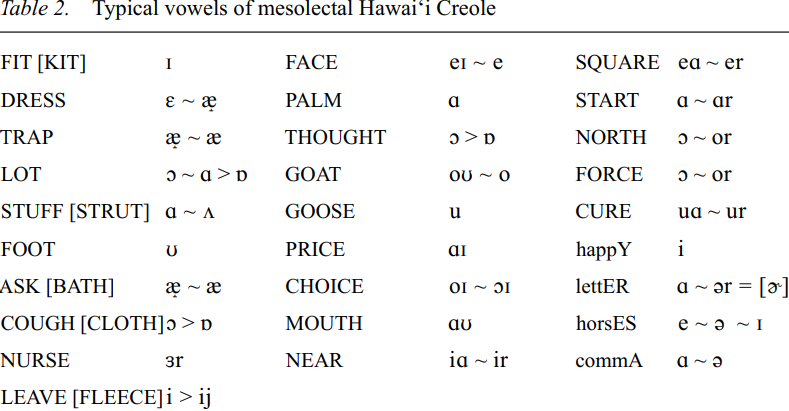


 Grammar
Grammar
 Tenses
Tenses
 Present
Present
 Past
Past
 Future
Future
 Parts Of Speech
Parts Of Speech
 Nouns
Nouns
 Verbs
Verbs
 Adverbs
Adverbs
 Adjectives
Adjectives
 Pronouns
Pronouns
 Pre Position
Pre Position
 Preposition by function
Preposition by function 
 Preposition by construction
Preposition by construction
 Conjunctions
Conjunctions
 Interjections
Interjections
 Grammar Rules
Grammar Rules
 Linguistics
Linguistics
 Semantics
Semantics
 Pragmatics
Pragmatics
 Reading Comprehension
Reading Comprehension|
Read More
Date: 2024-07-01
Date: 2023-08-24
Date: 14-4-2022
|
In mesolectal varieties, the distinctive basilectal vowels vary with the corresponding vowels in General American English. The exceptions are that the raising and tensing of [ɪ] and [ʊ] is generally avoided (since it is a salient marker of basilectal speech). Thus, for speakers of mesolectal and acrolectal varieties, /i/, [ɪ] , /u/ and [ʊ] are separate phonemes.
The typical mesolectal vowels are shown in Table 2, with further discussion below.

Many varieties of American English are spoken in Hawai‘i. For Hawai‘i Creole speakers who speak varieties with the THOUGHT-LOT merger, the distinctions in the vowels in LOT, COUGH [CLOTH] and [THOUGHT] are neutralized, and the vowel is pronounced as [ɒ] which may vary with [ɔ]. Because of this factor, there is some intra- and inter-speaker variation in the pronunciation of certain lexical items ([ɑ] vs. [ɒ] or [ɔ]): for example, in job, stop, dock, problem and model (Odo 1977). Because of the fact that [Λ] in STUFF [STRUT] is still pronounced as [ɑ] by some mesolectal speakers, there are some speakers who pronounce cot and caught the same [khɔt] , [khɒt] in contrast with cut [khɑt], and others who pronounce cot and cut the same [khɑt] in contrast with caught [khɔt].
|
|
|
|
لخفض ضغط الدم.. دراسة تحدد "تمارين مهمة"
|
|
|
|
|
|
|
طال انتظارها.. ميزة جديدة من "واتساب" تعزز الخصوصية
|
|
|
|
|
|
|
مشاتل الكفيل تزيّن مجمّع أبي الفضل العبّاس (عليه السلام) بالورد استعدادًا لحفل التخرج المركزي
|
|
|